外研版英语九下 Module 1 Travel语法突破写作指导(共33张PPT)
文档属性
| 名称 | 外研版英语九下 Module 1 Travel语法突破写作指导(共33张PPT) | 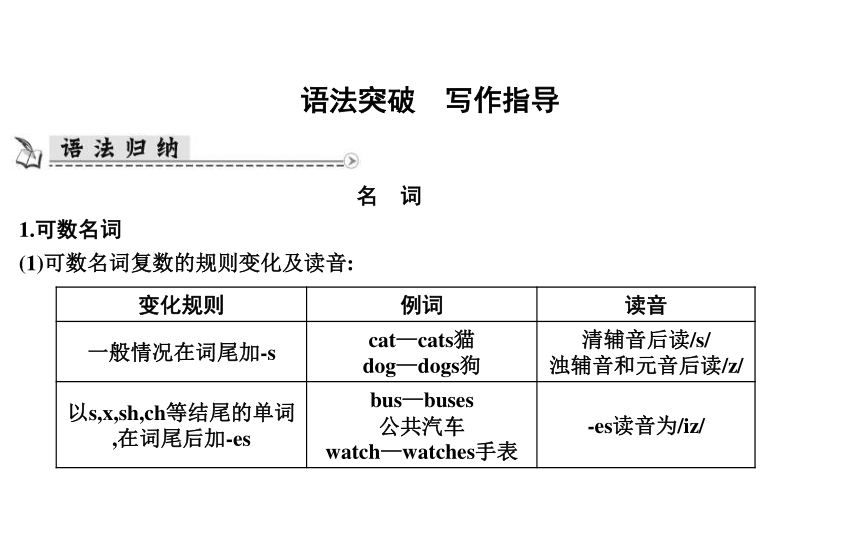 | |
| 格式 | ppt | ||
| 文件大小 | 3.1MB | ||
| 资源类型 | 教案 | ||
| 版本资源 | 外研版 | ||
| 科目 | 英语 | ||
| 更新时间 | 2024-01-16 20:04:30 | ||
图片预览

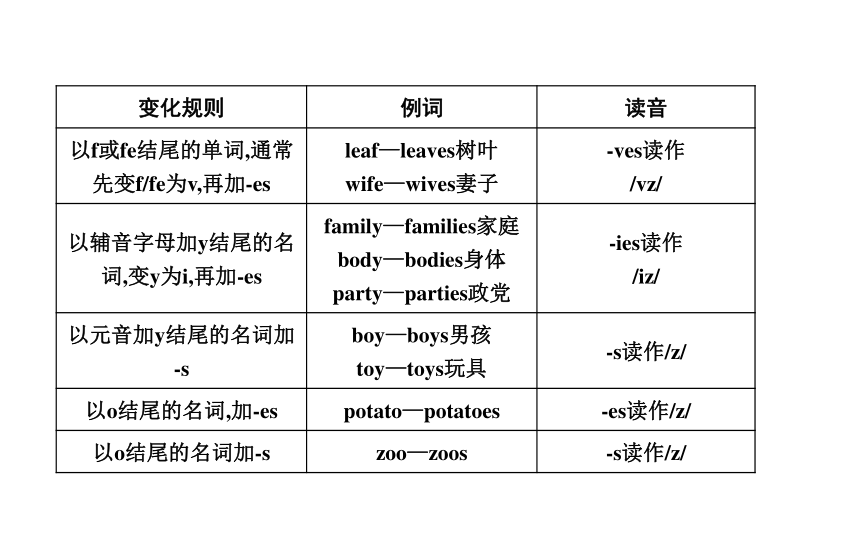
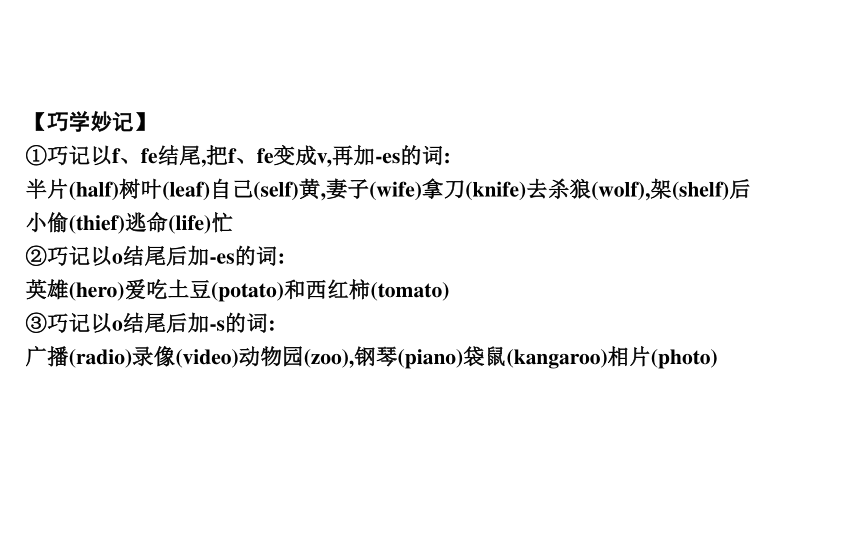
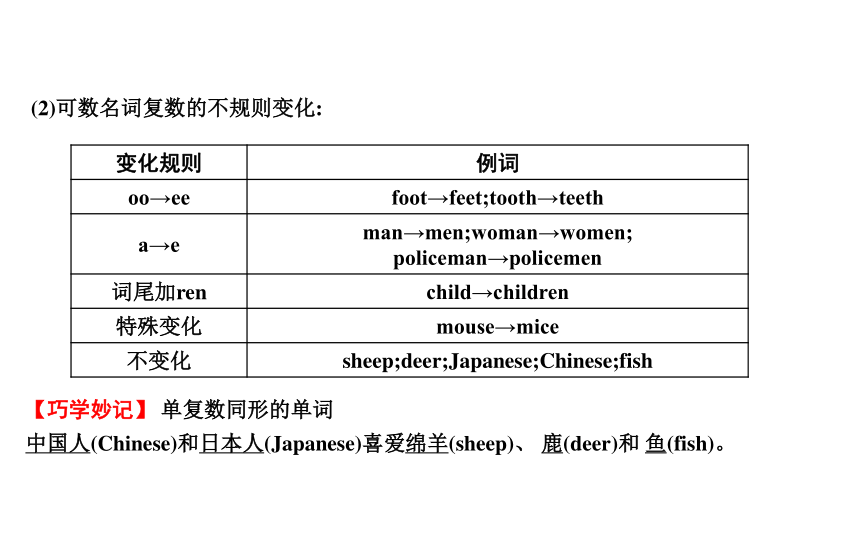
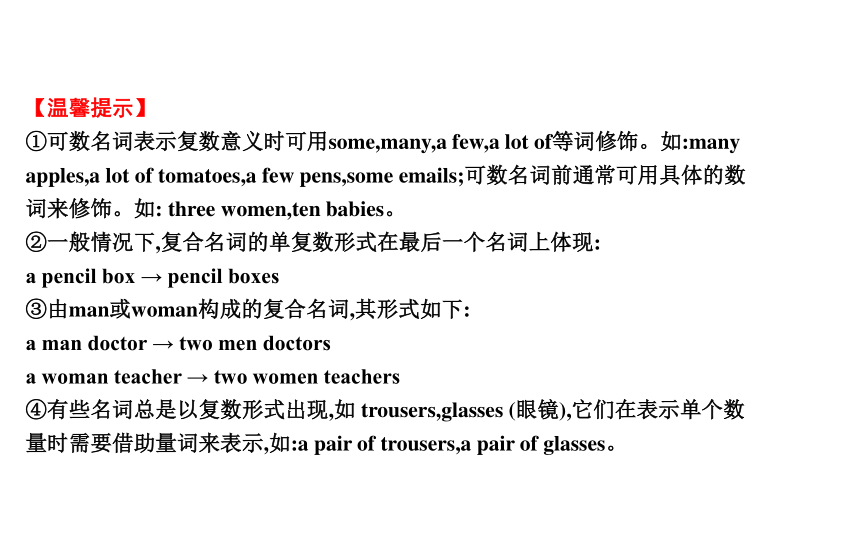
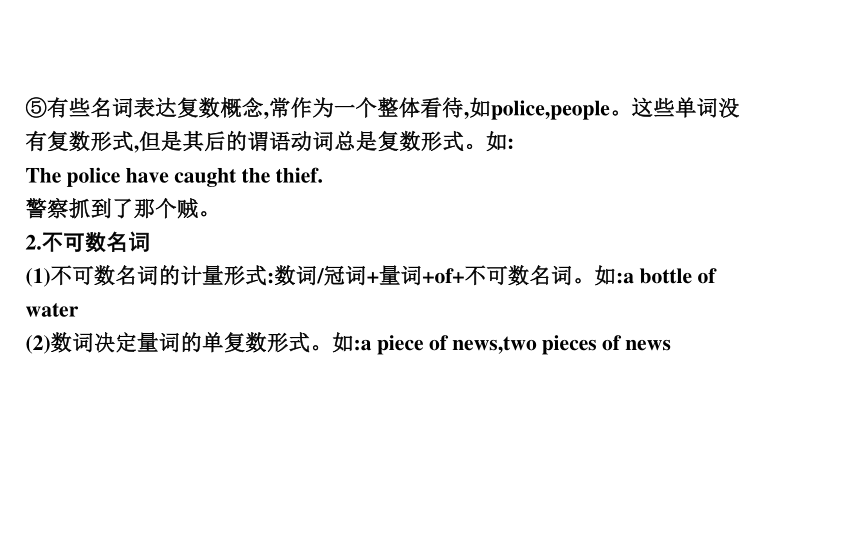
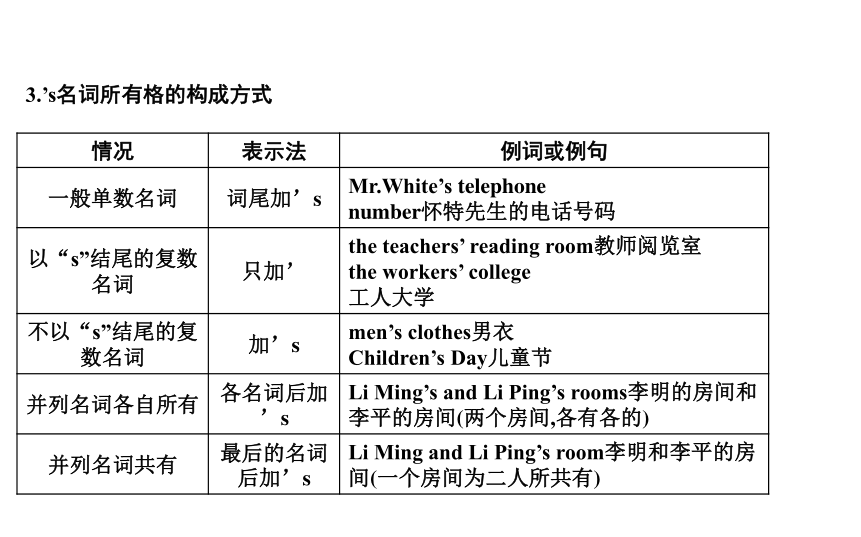
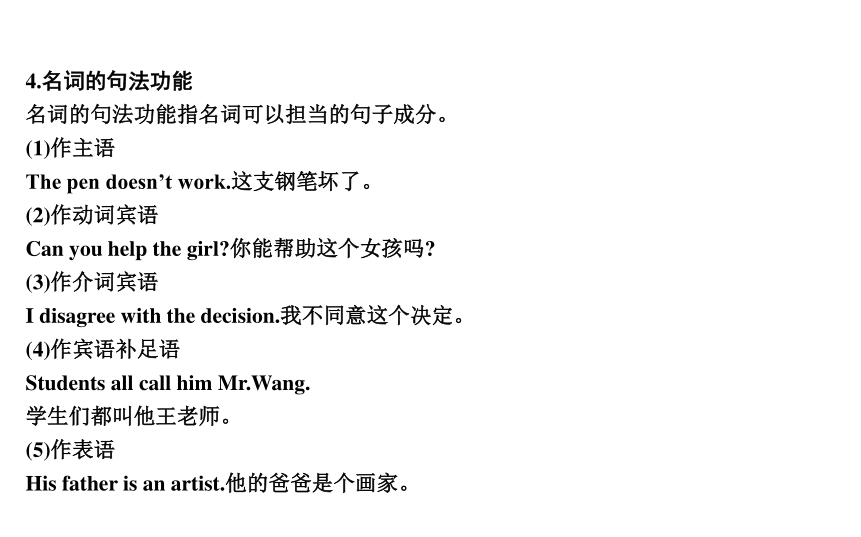
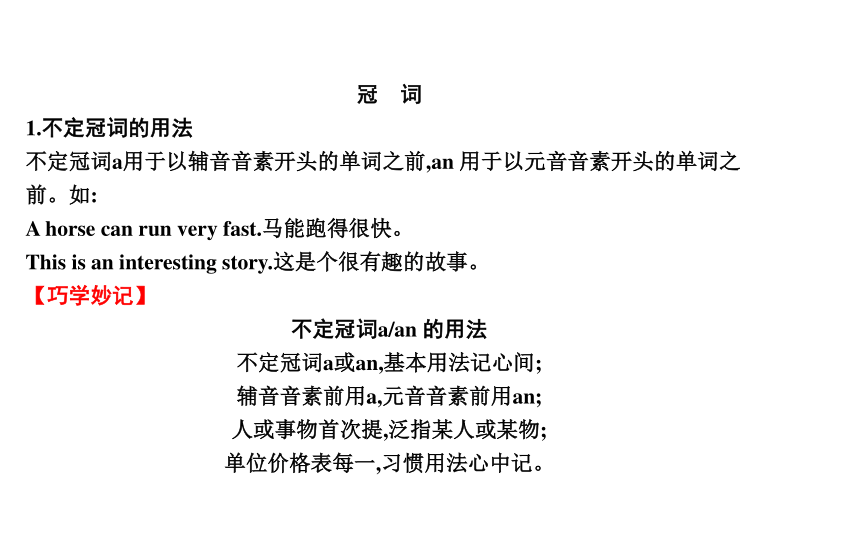
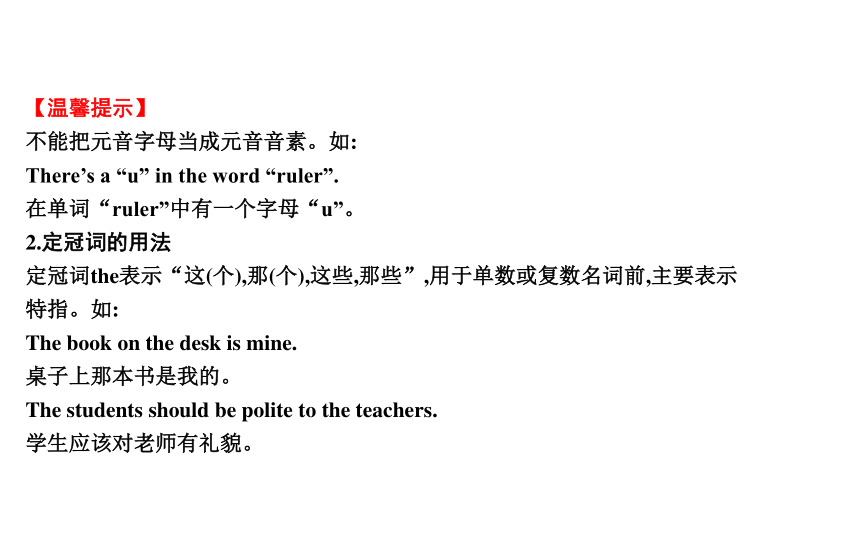

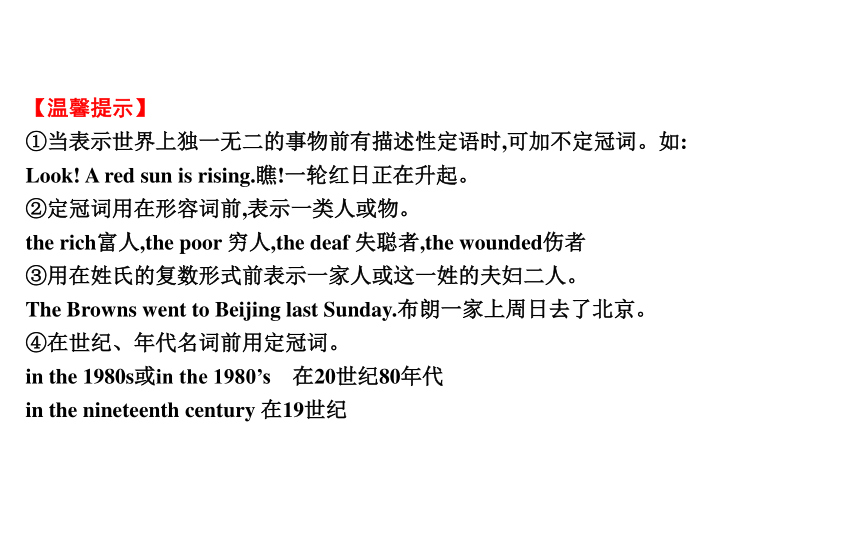
文档简介
(共33张PPT)
语法突破 写作指导
名 词
1.可数名词
(1)可数名词复数的规则变化及读音:
变化规则 例词 读音
一般情况在词尾加-s cat—cats猫
dog—dogs狗 清辅音后读/s/
浊辅音和元音后读/z/
以s,x,sh,ch等结尾的单词,在词尾后加-es bus—buses
公共汽车
watch—watches手表 -es读音为/iz/
变化规则 例词 读音
以f或fe结尾的单词,通常先变f/fe为v,再加-es leaf—leaves树叶
wife—wives妻子 -ves读作
/vz/
以辅音字母加y结尾的名词,变y为i,再加-es family—families家庭
body—bodies身体
party—parties政党 -ies读作
/iz/
以元音加y结尾的名词加-s boy—boys男孩
toy—toys玩具 -s读作/z/
以o结尾的名词,加-es potato—potatoes -es读作/z/
以o结尾的名词加-s zoo—zoos -s读作/z/
【巧学妙记】
①巧记以f、fe结尾,把f、fe变成v,再加-es的词:
半片(half)树叶(leaf)自己(self)黄,妻子(wife)拿刀(knife)去杀狼(wolf),架(shelf)后小偷(thief)逃命(life)忙
②巧记以o结尾后加-es的词:
英雄(hero)爱吃土豆(potato)和西红柿(tomato)
③巧记以o结尾后加-s的词:
广播(radio)录像(video)动物园(zoo),钢琴(piano)袋鼠(kangaroo)相片(photo)
(2)可数名词复数的不规则变化:
【巧学妙记】 单复数同形的单词
中国人(Chinese)和日本人(Japanese)喜爱绵羊(sheep)、 鹿(deer)和 鱼(fish)。
变化规则 例词
oo→ee foot→feet;tooth→teeth
a→e man→men;woman→women;
policeman→policemen
词尾加ren child→children
特殊变化 mouse→mice
不变化 sheep;deer;Japanese;Chinese;fish
【温馨提示】
①可数名词表示复数意义时可用some,many,a few,a lot of等词修饰。如:many apples,a lot of tomatoes,a few pens,some emails;可数名词前通常可用具体的数词来修饰。如: three women,ten babies。
②一般情况下,复合名词的单复数形式在最后一个名词上体现:
a pencil box → pencil boxes
③由man或woman构成的复合名词,其形式如下:
a man doctor → two men doctors
a woman teacher → two women teachers
④有些名词总是以复数形式出现,如 trousers,glasses (眼镜),它们在表示单个数量时需要借助量词来表示,如:a pair of trousers,a pair of glasses。
⑤有些名词表达复数概念,常作为一个整体看待,如police,people。这些单词没有复数形式,但是其后的谓语动词总是复数形式。如:
The police have caught the thief.
警察抓到了那个贼。
2.不可数名词
(1)不可数名词的计量形式:数词/冠词+量词+of+不可数名词。如:a bottle of water
(2)数词决定量词的单复数形式。如:a piece of news,two pieces of news
3.’s名词所有格的构成方式
情况 表示法 例词或例句
一般单数名词 词尾加’s Mr.White’s telephone
number怀特先生的电话号码
以“s”结尾的复数名词 只加’ the teachers’ reading room教师阅览室
the workers’ college
工人大学
不以“s”结尾的复数名词 加’s men’s clothes男衣
Children’s Day儿童节
并列名词各自所有 各名词后加’s Li Ming’s and Li Ping’s rooms李明的房间和李平的房间(两个房间,各有各的)
并列名词共有 最后的名词后加’s Li Ming and Li Ping’s room李明和李平的房间(一个房间为二人所共有)
4.名词的句法功能
名词的句法功能指名词可以担当的句子成分。
(1)作主语
The pen doesn’t work.这支钢笔坏了。
(2)作动词宾语
Can you help the girl 你能帮助这个女孩吗
(3)作介词宾语
I disagree with the decision.我不同意这个决定。
(4)作宾语补足语
Students all call him Mr.Wang.
学生们都叫他王老师。
(5)作表语
His father is an artist.他的爸爸是个画家。
冠 词
1.不定冠词的用法
不定冠词a用于以辅音音素开头的单词之前,an 用于以元音音素开头的单词之前。如:
A horse can run very fast.马能跑得很快。
This is an interesting story.这是个很有趣的故事。
【巧学妙记】
不定冠词a/an 的用法
不定冠词a或an,基本用法记心间;
辅音音素前用a,元音音素前用an;
人或事物首次提,泛指某人或某物;
单位价格表每一,习惯用法心中记。
【温馨提示】
不能把元音字母当成元音音素。如:
There’s a “u” in the word “ruler”.
在单词“ruler”中有一个字母“u”。
2.定冠词的用法
定冠词the表示“这(个),那(个),这些,那些”,用于单数或复数名词前,主要表示特指。如:
The book on the desk is mine.
桌子上那本书是我的。
The students should be polite to the teachers.
学生应该对老师有礼貌。
【巧学妙记】
定冠词的用法
特指双熟悉,上文已提及;
世上独无二,序数最高级;
某些专有名,习语和乐器。
【温馨提示】
①当表示世界上独一无二的事物前有描述性定语时,可加不定冠词。如:
Look! A red sun is rising.瞧!一轮红日正在升起。
②定冠词用在形容词前,表示一类人或物。
the rich富人,the poor 穷人,the deaf 失聪者,the wounded伤者
③用在姓氏的复数形式前表示一家人或这一姓的夫妇二人。
The Browns went to Beijing last Sunday.布朗一家上周日去了北京。
④在世纪、年代名词前用定冠词。
in the 1980s或in the 1980’s 在20世纪80年代
in the nineteenth century 在19世纪
3.零冠词
在特定情况下,某些名词前不需要用冠词,这种情况我们称为“零冠词”。如:
It’s Sunday today.今天是星期天。
Can you play chess 你会下象棋吗
【巧学妙记】
零冠词的用法
代词限定名词前,专有名词不可数;
学科球类三餐饭,四季星期月份前;
颜色语种和国名,称呼习语和头衔。
【温馨提示】
①特指某年的季节或与during连用时用定冠词the。如:
in the winter of 2013 在2013年的冬季
②三餐前如有形容词修饰,也要加冠词。如:
After a quick breakfast,she went to work.
她迅速吃了早餐就去上班了。
数 词
1.基数词与序数词
关于基数词与序数词的不同写法尤其要注意以下几组:
one—first;two—second;three—third;forty—fortieth;five—fifth;eight—eighth;nine—ninth;twelve—twelfth
2.数词的用法:英语中数词可在句中作定语、主语、宾语、状语等。
注意:①hundred,thousand,million与数词连用时通常不带复数词尾-s,但若用于表示数百、数千、数百万这样的泛指概念时,则用复数。
②在以名词为中心,前面有冠词、数词以及形容词的结构中,这些词语的排列顺序为“冠词+数词+形容词+名词”。如:the three little pigs三只小猪
单项选择
( )1.The woman wearing a pair of glasses is .(2019贺州)
A.Lily and Lucy’s mother
B.Lily’s and Lucy’s mother
C.Lily’s and Lucy’s mothers
D.Lily and Lucy’s mothers
( )2.— Smiths are used to living in Shanghai now.
—We hope more and more foreign friends live better life in China.
(2019玉林)
A./; a B.The; an
C.The; a D./; the
A
C
( )3.Hong Kong-Zhuhai-Macao Bridge, the world’s longest sea-based project, brings people in those three cities within “one-hour living circle”. (2019 东营)
A.a B.an C.the D./
( )4. of the students in our class
going to summer camp in Beijing next week.(2019天水)
A.Two fifths;is
B.Second fifths;are
C.Second fifths;is
D.Two fifths;are
A
D
( )5.—Do you know how to spell word “expensive” in English
—Yes. It begins with “e”. (2019眉山)
A.the; a B.the; an
C.a; an D.the; the
( )6.Every year, books are given away to the poor children in the countryside.(2019郴州)
A.thousand B.thousands of
C.thousand of
( )7.The problems are difficult to solve. Please give me .(2019大庆)
A.many advice B.some advice
C.an advice D.some advices
B
B
B
( )8.Chinese learning is popular with people all over world.(2019海南)
A.a B./ C.the
( )9.—Is Dongjin High-speed Railway Station the largest in Hubei Province
—Yes, of course. It’s just a little smaller than the largest one in Wuhan. (2019襄阳)
A.first B.second
C.third D.fourth
C
B
( )10.—How many books are there on the shelf
—Well. I think there are books.(2019湘西)
A.two hundred and forty-six
B.two hundreds and forty
C.two hundred fourteen
( )11. room looks very clean. (2019怀化)
A.Bob and Dave’s
B.Bob’s and Dave’s
C.Bob’s and Dave
A
A
( )12.On April 24, Xie Wenjun raced to gold in the 110-meter hurdles at the Asian Athletics Championships in Qatar. (2019连云港)
A.man B.men
C.men’s D.mens’
( )13.I am going to have picnic on Sunday.(2019天津)
A.the; an B.an; the
C.a; 不填 D.an; 不填
C
C
( )14.The earth is often called the ocean planet. Its surface is 70 percent . (2019云南)
A.land B.planets
C.animals D.water
( )15.Hurry up! Some and are on sale in the supermarket. (2019凉山)
A.tomato; egg B.tomatoes; egg
C.tomatoes; eggs D.tomato; eggs
D
C
本模块的话题是“旅游生活”。在写这类作文时,一般从旅行的时间、地点、人物及旅行的方式等方面入手。文中应涉及旅行的经过、主要参观的景点、令自己难忘的事情、此次旅行的感想等。
1.话题词汇
2.常用句型
(1)这是我第一次去北京的旅行。
This is my Beijing.
(2)我和同班同学一起去了故宫。
I to the Palace Museum my classmates.
(3)我给妈妈买了一些特别的东西作为礼物。
I bought for my mum as presents.
(4)由于天气很糟,我们没能拍到很好的照片。
We couldn’t take any good photos the bad weather.
(5)虽然我有点累,但是我们玩得很开心。
We though I was a little .
first
trip
to
went
with
something
special
because
of
had
a
great/good/wonderful
time
tired
1.写作要求
根据提示,写一篇英语短文。
(1)去年夏天我和父母一起去了青岛度假。我们是坐高铁去的。(vacation;take the high-speed railway)
(2)那一天很美好。天气晴朗又凉爽。(sunny;cool)
(3)我们在海边做游戏,坐船到海里。我还学会了游泳。(on the beach;by boat;learn swimming)
(4)我们吃了海鲜,味道很鲜美。(seafood;delicious)
(5)爸爸给我们拍了很多照片。我们度过了愉快的时光。(quite a few;take photos;have a wonderful time)
要求:
(1)词数:80左右;
(2)字迹工整,语言流畅,逻辑清晰。
2.思路点拨
(1)体裁:记叙文
(2)人称:第一人称
(3)时态:一般过去时
(4)写作导图:
3.范文借鉴
假如你是李华,你的美国朋友John计划暑假来中国旅游。请你根据以下图示,用英语在QQ中给他留言,介绍并推荐你的家乡福建,词数80左右。
要求:
1.必须包含所有提示信息,开头与结尾已给出,不计入总词数;
2.意思清楚,表达通顺,行文连贯,书写规范;
3.请勿在文中使用真实的姓名、校名及提示信息以外的地名。
Hi John,
I’m glad to hear that you’re planning to travel around China during the summer vacation.I’d like to invite you to my hometown Fujian for a visit.
Fujian lies
I’m looking forward to meeting you!
Yours,
Li Hua
【小编特别提醒】 一定要注意书写,也要注意文章时态,向大家介绍你的家乡,与大家一起分享你家乡的美景。
One possible version:
Hi John,
I’m glad to hear that you’re planning to travel around China during the summer vacation.I’d like to invite you to my hometown Fujian for a visit.
Fujian lies in the southeast of China with Fuzhou as its capital city.It has a population of over 38 million.Because of the nice environment,it’s known as Refreshing Fujian,which attracts millions of tourists from home and abroad.If you come,you can enjoy fresh air,blue sky as well as beautiful mountains and clear rivers.Many famous places of interest like Mount Wuyi and Gulang Island are well worth visiting.Besides,you can taste various kinds of delicious food.
I’m looking forward to meeting you!
Yours,
Li Hua
语法突破 写作指导
名 词
1.可数名词
(1)可数名词复数的规则变化及读音:
变化规则 例词 读音
一般情况在词尾加-s cat—cats猫
dog—dogs狗 清辅音后读/s/
浊辅音和元音后读/z/
以s,x,sh,ch等结尾的单词,在词尾后加-es bus—buses
公共汽车
watch—watches手表 -es读音为/iz/
变化规则 例词 读音
以f或fe结尾的单词,通常先变f/fe为v,再加-es leaf—leaves树叶
wife—wives妻子 -ves读作
/vz/
以辅音字母加y结尾的名词,变y为i,再加-es family—families家庭
body—bodies身体
party—parties政党 -ies读作
/iz/
以元音加y结尾的名词加-s boy—boys男孩
toy—toys玩具 -s读作/z/
以o结尾的名词,加-es potato—potatoes -es读作/z/
以o结尾的名词加-s zoo—zoos -s读作/z/
【巧学妙记】
①巧记以f、fe结尾,把f、fe变成v,再加-es的词:
半片(half)树叶(leaf)自己(self)黄,妻子(wife)拿刀(knife)去杀狼(wolf),架(shelf)后小偷(thief)逃命(life)忙
②巧记以o结尾后加-es的词:
英雄(hero)爱吃土豆(potato)和西红柿(tomato)
③巧记以o结尾后加-s的词:
广播(radio)录像(video)动物园(zoo),钢琴(piano)袋鼠(kangaroo)相片(photo)
(2)可数名词复数的不规则变化:
【巧学妙记】 单复数同形的单词
中国人(Chinese)和日本人(Japanese)喜爱绵羊(sheep)、 鹿(deer)和 鱼(fish)。
变化规则 例词
oo→ee foot→feet;tooth→teeth
a→e man→men;woman→women;
policeman→policemen
词尾加ren child→children
特殊变化 mouse→mice
不变化 sheep;deer;Japanese;Chinese;fish
【温馨提示】
①可数名词表示复数意义时可用some,many,a few,a lot of等词修饰。如:many apples,a lot of tomatoes,a few pens,some emails;可数名词前通常可用具体的数词来修饰。如: three women,ten babies。
②一般情况下,复合名词的单复数形式在最后一个名词上体现:
a pencil box → pencil boxes
③由man或woman构成的复合名词,其形式如下:
a man doctor → two men doctors
a woman teacher → two women teachers
④有些名词总是以复数形式出现,如 trousers,glasses (眼镜),它们在表示单个数量时需要借助量词来表示,如:a pair of trousers,a pair of glasses。
⑤有些名词表达复数概念,常作为一个整体看待,如police,people。这些单词没有复数形式,但是其后的谓语动词总是复数形式。如:
The police have caught the thief.
警察抓到了那个贼。
2.不可数名词
(1)不可数名词的计量形式:数词/冠词+量词+of+不可数名词。如:a bottle of water
(2)数词决定量词的单复数形式。如:a piece of news,two pieces of news
3.’s名词所有格的构成方式
情况 表示法 例词或例句
一般单数名词 词尾加’s Mr.White’s telephone
number怀特先生的电话号码
以“s”结尾的复数名词 只加’ the teachers’ reading room教师阅览室
the workers’ college
工人大学
不以“s”结尾的复数名词 加’s men’s clothes男衣
Children’s Day儿童节
并列名词各自所有 各名词后加’s Li Ming’s and Li Ping’s rooms李明的房间和李平的房间(两个房间,各有各的)
并列名词共有 最后的名词后加’s Li Ming and Li Ping’s room李明和李平的房间(一个房间为二人所共有)
4.名词的句法功能
名词的句法功能指名词可以担当的句子成分。
(1)作主语
The pen doesn’t work.这支钢笔坏了。
(2)作动词宾语
Can you help the girl 你能帮助这个女孩吗
(3)作介词宾语
I disagree with the decision.我不同意这个决定。
(4)作宾语补足语
Students all call him Mr.Wang.
学生们都叫他王老师。
(5)作表语
His father is an artist.他的爸爸是个画家。
冠 词
1.不定冠词的用法
不定冠词a用于以辅音音素开头的单词之前,an 用于以元音音素开头的单词之前。如:
A horse can run very fast.马能跑得很快。
This is an interesting story.这是个很有趣的故事。
【巧学妙记】
不定冠词a/an 的用法
不定冠词a或an,基本用法记心间;
辅音音素前用a,元音音素前用an;
人或事物首次提,泛指某人或某物;
单位价格表每一,习惯用法心中记。
【温馨提示】
不能把元音字母当成元音音素。如:
There’s a “u” in the word “ruler”.
在单词“ruler”中有一个字母“u”。
2.定冠词的用法
定冠词the表示“这(个),那(个),这些,那些”,用于单数或复数名词前,主要表示特指。如:
The book on the desk is mine.
桌子上那本书是我的。
The students should be polite to the teachers.
学生应该对老师有礼貌。
【巧学妙记】
定冠词的用法
特指双熟悉,上文已提及;
世上独无二,序数最高级;
某些专有名,习语和乐器。
【温馨提示】
①当表示世界上独一无二的事物前有描述性定语时,可加不定冠词。如:
Look! A red sun is rising.瞧!一轮红日正在升起。
②定冠词用在形容词前,表示一类人或物。
the rich富人,the poor 穷人,the deaf 失聪者,the wounded伤者
③用在姓氏的复数形式前表示一家人或这一姓的夫妇二人。
The Browns went to Beijing last Sunday.布朗一家上周日去了北京。
④在世纪、年代名词前用定冠词。
in the 1980s或in the 1980’s 在20世纪80年代
in the nineteenth century 在19世纪
3.零冠词
在特定情况下,某些名词前不需要用冠词,这种情况我们称为“零冠词”。如:
It’s Sunday today.今天是星期天。
Can you play chess 你会下象棋吗
【巧学妙记】
零冠词的用法
代词限定名词前,专有名词不可数;
学科球类三餐饭,四季星期月份前;
颜色语种和国名,称呼习语和头衔。
【温馨提示】
①特指某年的季节或与during连用时用定冠词the。如:
in the winter of 2013 在2013年的冬季
②三餐前如有形容词修饰,也要加冠词。如:
After a quick breakfast,she went to work.
她迅速吃了早餐就去上班了。
数 词
1.基数词与序数词
关于基数词与序数词的不同写法尤其要注意以下几组:
one—first;two—second;three—third;forty—fortieth;five—fifth;eight—eighth;nine—ninth;twelve—twelfth
2.数词的用法:英语中数词可在句中作定语、主语、宾语、状语等。
注意:①hundred,thousand,million与数词连用时通常不带复数词尾-s,但若用于表示数百、数千、数百万这样的泛指概念时,则用复数。
②在以名词为中心,前面有冠词、数词以及形容词的结构中,这些词语的排列顺序为“冠词+数词+形容词+名词”。如:the three little pigs三只小猪
单项选择
( )1.The woman wearing a pair of glasses is .(2019贺州)
A.Lily and Lucy’s mother
B.Lily’s and Lucy’s mother
C.Lily’s and Lucy’s mothers
D.Lily and Lucy’s mothers
( )2.— Smiths are used to living in Shanghai now.
—We hope more and more foreign friends live better life in China.
(2019玉林)
A./; a B.The; an
C.The; a D./; the
A
C
( )3.Hong Kong-Zhuhai-Macao Bridge, the world’s longest sea-based project, brings people in those three cities within “one-hour living circle”. (2019 东营)
A.a B.an C.the D./
( )4. of the students in our class
going to summer camp in Beijing next week.(2019天水)
A.Two fifths;is
B.Second fifths;are
C.Second fifths;is
D.Two fifths;are
A
D
( )5.—Do you know how to spell word “expensive” in English
—Yes. It begins with “e”. (2019眉山)
A.the; a B.the; an
C.a; an D.the; the
( )6.Every year, books are given away to the poor children in the countryside.(2019郴州)
A.thousand B.thousands of
C.thousand of
( )7.The problems are difficult to solve. Please give me .(2019大庆)
A.many advice B.some advice
C.an advice D.some advices
B
B
B
( )8.Chinese learning is popular with people all over world.(2019海南)
A.a B./ C.the
( )9.—Is Dongjin High-speed Railway Station the largest in Hubei Province
—Yes, of course. It’s just a little smaller than the largest one in Wuhan. (2019襄阳)
A.first B.second
C.third D.fourth
C
B
( )10.—How many books are there on the shelf
—Well. I think there are books.(2019湘西)
A.two hundred and forty-six
B.two hundreds and forty
C.two hundred fourteen
( )11. room looks very clean. (2019怀化)
A.Bob and Dave’s
B.Bob’s and Dave’s
C.Bob’s and Dave
A
A
( )12.On April 24, Xie Wenjun raced to gold in the 110-meter hurdles at the Asian Athletics Championships in Qatar. (2019连云港)
A.man B.men
C.men’s D.mens’
( )13.I am going to have picnic on Sunday.(2019天津)
A.the; an B.an; the
C.a; 不填 D.an; 不填
C
C
( )14.The earth is often called the ocean planet. Its surface is 70 percent . (2019云南)
A.land B.planets
C.animals D.water
( )15.Hurry up! Some and are on sale in the supermarket. (2019凉山)
A.tomato; egg B.tomatoes; egg
C.tomatoes; eggs D.tomato; eggs
D
C
本模块的话题是“旅游生活”。在写这类作文时,一般从旅行的时间、地点、人物及旅行的方式等方面入手。文中应涉及旅行的经过、主要参观的景点、令自己难忘的事情、此次旅行的感想等。
1.话题词汇
2.常用句型
(1)这是我第一次去北京的旅行。
This is my Beijing.
(2)我和同班同学一起去了故宫。
I to the Palace Museum my classmates.
(3)我给妈妈买了一些特别的东西作为礼物。
I bought for my mum as presents.
(4)由于天气很糟,我们没能拍到很好的照片。
We couldn’t take any good photos the bad weather.
(5)虽然我有点累,但是我们玩得很开心。
We though I was a little .
first
trip
to
went
with
something
special
because
of
had
a
great/good/wonderful
time
tired
1.写作要求
根据提示,写一篇英语短文。
(1)去年夏天我和父母一起去了青岛度假。我们是坐高铁去的。(vacation;take the high-speed railway)
(2)那一天很美好。天气晴朗又凉爽。(sunny;cool)
(3)我们在海边做游戏,坐船到海里。我还学会了游泳。(on the beach;by boat;learn swimming)
(4)我们吃了海鲜,味道很鲜美。(seafood;delicious)
(5)爸爸给我们拍了很多照片。我们度过了愉快的时光。(quite a few;take photos;have a wonderful time)
要求:
(1)词数:80左右;
(2)字迹工整,语言流畅,逻辑清晰。
2.思路点拨
(1)体裁:记叙文
(2)人称:第一人称
(3)时态:一般过去时
(4)写作导图:
3.范文借鉴
假如你是李华,你的美国朋友John计划暑假来中国旅游。请你根据以下图示,用英语在QQ中给他留言,介绍并推荐你的家乡福建,词数80左右。
要求:
1.必须包含所有提示信息,开头与结尾已给出,不计入总词数;
2.意思清楚,表达通顺,行文连贯,书写规范;
3.请勿在文中使用真实的姓名、校名及提示信息以外的地名。
Hi John,
I’m glad to hear that you’re planning to travel around China during the summer vacation.I’d like to invite you to my hometown Fujian for a visit.
Fujian lies
I’m looking forward to meeting you!
Yours,
Li Hua
【小编特别提醒】 一定要注意书写,也要注意文章时态,向大家介绍你的家乡,与大家一起分享你家乡的美景。
One possible version:
Hi John,
I’m glad to hear that you’re planning to travel around China during the summer vacation.I’d like to invite you to my hometown Fujian for a visit.
Fujian lies in the southeast of China with Fuzhou as its capital city.It has a population of over 38 million.Because of the nice environment,it’s known as Refreshing Fujian,which attracts millions of tourists from home and abroad.If you come,you can enjoy fresh air,blue sky as well as beautiful mountains and clear rivers.Many famous places of interest like Mount Wuyi and Gulang Island are well worth visiting.Besides,you can taste various kinds of delicious food.
I’m looking forward to meeting you!
Yours,
Li Hua
同课章节目录
- Module 1 Travel
- Unit 1 We toured the city by bus and by taxi
- Unit 2 It's a long story.
- Unit 3 Language in use
- Module 2 Education
- Unit 1 They don't sit in rows.
- Unit 2 What do I like best about school?
- Unit 3 Language in use
- Module 3 Life now and then
- Unit 1 They sometimes work harder.
- Unit 2 I think life is better today.
- Unit 3 Language in use.
- Module 4 Rules and suggestions
- Unit 1 You must be careful of falling stones.
- Unit 2 we must keep the camp clean.
- Unit 3 Language in use.
- Revison A
- Module 5 Look after yourself
- Unit 1 We'd better get you to hospital.
- Unit 2 Get off the sofa!
- Unit 3 Language in use.
- Module 6 Eating togethe
- Unit 1 When is the school-leavers' party?
- Unit 2 Knives and forks are used for most Western
- Unit 3 Language in use
- Module 7 English for you and me
- Unit 1 Have you ever been to an English corner?
- Unit 2 We all own English.
- Unit 3 Language in use
- Module 8 My future life
- Unit 1 Here's to our friendship and the future
- Unit 2 I know that you will be better at maths.
- Unit 3 Language in use
- Revison B
